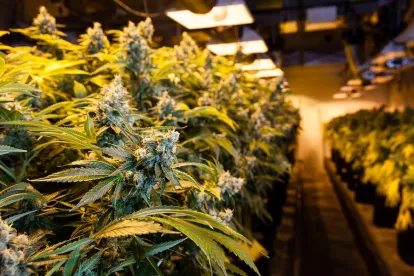In the past several years, marijuana legalization has become an increasingly difficult issue for employers to navigate. Marijuana legalization raises challenging workplace questions related to drug testing, disability accommodation, workplace safety, hiring, and employment termination, among other issues. Because of the fast-evolving nature of marijuana laws, and the wide variance in laws and protections from state to state, employers have struggled to keep up.
The COVID-19 pandemic put a halt to many state legislative or citizen-driven initiative efforts to legalize marijuana for either medicinal or recreational purposes, or to expand current marijuana legalization, including in Alabama, Arkansas, Florida, Kentucky, Idaho, Missouri, and North Dakota.
However, several states will have the opportunity in November 2020 to vote on marijuana legalization through ballot initiatives and state constitutional amendments. In addition, the United States House of Representatives will soon vote on legislation that would remove marijuana from Schedule I of the Controlled Substances Act.
Here is a roundup of marijuana legalization efforts that could affect employers as we head into 2021.
National
The United States House of Representatives is set to vote in September 2020 on the Marijuana Opportunity Reinvestment and Expungement (MORE) Act of 2019 (H.R. 3884). The bill, among other things, would remove cannabis as a Schedule I controlled substance and, in turn, essentially decriminalize marijuana at the federal level. While this is an intriguing development, regardless of the results of the House vote, it seems unlikely that the bill will be able to advance through the United States Senate given its current makeup. Perhaps the more important takeaway from this development is that federal decriminalization of marijuana could be an issue that gains momentum in the coming years.
Arizona
Proposition 207 (the Smart and Safe Arizona Act) would legalize the possession and recreational (i.e., nonmedicinal) use of marijuana by adults age 21 and over in Arizona. Proposition 207 does not contain any express protections for applicants for employment or employees, and it does not prohibit employers from testing for marijuana. If passed, Proposition 207 would join the current Arizona Medical Marijuana Act—which does contain employment protections for medical marijuana cardholders in Arizona.
If Arizona voters approve Proposition 207, the deadline for Arizona lawmakers to establish regulations governing the Arizona recreational marijuana industry would be April 5, 2021.
Mississippi
Initiative Measure No. 65 and Alternative Initiative Measure No. 65A (House Concurrent Resolution 39) represent two versions of a medical marijuana amendment to the Mississippi Constitution. Initiative Measure No. 65 is a citizen-driven ballot initiative, whereas Alternative Initiative Measure No. 65A was referred to the ballot as an alternative measure by the Mississippi Legislature. While both measures would amend the state constitution to create a state medical marijuana program, Alternative Initiative Measure No. 65A is less specific in its language, meaning that the state legislature would subsequently be able to include further details as to its scope.
Importantly, Alternative Initiative Measure No. 65A would limit medical marijuana access only to “qualified persons with debilitating medical conditions” and restrict “[t]he smoking of marijuana products … to the treatment of qualified persons who have terminal medical conditions.” In contrast, Initiative Measure No. 65 reflects a more traditional medical marijuana law and lists more than 20 qualifying conditions for cardholder status. Neither option contains any express protections for applicants for employment or employees, nor prohibits testing for marijuana.
If Initiative Measure No. 65 is passed, the deadline for the medical marijuana program to be operational would be August 15, 2021. Alternative Initiative Measure No. 65A does not contain a similar deadline.
Montana
Statutory Initiative No. 190 (I-190) and Constitutional Initiative No. 118 (CI-118) would legalize the possession and recreational use of marijuana for adults age 21 and over in Montana. I-190 and CI-118 do not contain any express protections for applicants for employment or employees, and they do not prohibit testing for marijuana. If passed, I-190 and CI-118 would join the current Montana Medical Marijuana Act—which also does not provide employment protections for medical marijuana cardholders in Montana.
If passed, the most relevant portions of I-190 and CI-118 would go into effect on January 1, 2021.
Nebraska
The Nebraska Medical Cannabis Constitutional Amendment would amend the Nebraska Constitution to legalize marijuana for medicinal purposes and would authorize the Nebraska Legislature to develop laws, rules, and regulations to govern the medical marijuana program. The ballot initiative does not contain any express protections for applicants for employment or employees, and it does not prohibit testing for marijuana.
Notably, the ballot initiative is currently being challenged in Nebraska state court. The Nebraska Supreme Court will determine whether the initiative violates state rules requiring ballot initiatives to focus on a “single subject.” Whether the initiative stays on the ballot for Nebraska voters remains to be seen.
New Jersey
Public Question No. 1 would add an amendment to the Constitution of the State of New Jersey to legalize the possession and recreational use of marijuana for adults age 21 and over in New Jersey. Public Question No. 1 does not contain any express protections for applicants for employment or employees, and it does not prohibit testing for marijuana. If passed, Public Question No. 1 would take its place alongside the current Jake Honig Compassionate Use Medical Cannabis Act—which does contain employment protections for medical marijuana cardholders in New Jersey.
If passed, Public Question No. 1 would go into effect on January 1, 2021.
South Dakota
Initiated Measure 26 would legalize marijuana for medicinal purposes. Initiated Measure 26 does not contain any express protections for applicants for employment or employees, and it does not prohibit testing for marijuana.
If passed, the deadline for the South Dakota Department of Health to enact rules implementing the medical marijuana program would be approximately October 29, 2021.
Constitutional Amendment A would legalize the possession and recreational use of marijuana for adults age 21 and over in South Dakota. Constitutional Amendment A does not contain any express protections for applicants for employment or employees, and it does not prohibit testing for marijuana.
Key Takeaways
Marijuana legalization continues to be a quickly moving area of the law. Employers may want to continue to monitor these developments with an expectation that legalization efforts will continue in the years to come.




 />i
/>i
